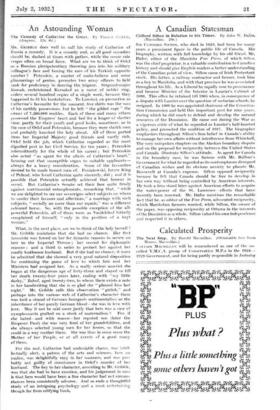A Canadian Statesman
SIR CLIFFORD Sir-TON, who died in 1929, had been for many years a prominent figure in the public life of Canada. His biography, written with full knowledge by his old friend. Mr. Dafoe, editor of the Manitoba Free Press, of which Sifton was the chief proprietor, is a valuable contribution to Canadian history and should give English readers a better understanding of the Canadian point of view. Sifton came of Irish Protestant stock. His father, a railway contractor and farmer, took hint as a boy to Manitoba, and with that province he was associated throughout his life. As a Liberal he rapidly rose to prominence and became Minister of the Interior in Laurier's Cabinet of 1890. This office he retained till 1905 when, in consequence of a dispute with Laurier over the question of sectarian schools, he resigned. In 1609 he was appointed chairman of the Conserva- tion Commission and held this important post for nine years, during which he did much to defend and develop the natural resources of the Dominion. He came out during the War as a vigorous critic of what he regarded as Laurier's half-hearted policy, and promoted the coalition of 1917. The biographer emphasizes throughout Sifton's firm belief in Canada's ability to manage her own affairs without interference from Whitehall. The very outspoken chapters on the Alaskan boundary dispute and on the proposal for reciprocity between the United States and Canada illustrate Sifton's attitude. As agent for Canada in the boundary case, he was furious with Mr. Balfour's Government for what he regarded as its contemptuous disregard of Canadian wishes and its obvious anxiety to placate Mr. Roosevelt at Canada's expense. Sifton opposed reciprocity because he felt that Canada should be free to develop in her own way without being controlled by American interests. He took a firm stand later against American efforts to acquire the water-power of the St. Lawrence—efforts that have recently been renewed. Mr. Dafoe mentions the remarkable fact that he, as editor of the Free Press, advocated reciprocity, which Manitoban farmers wanted, while Sifton, the owner of the paper, was opposing reciprocity at Ottawa in the interests of the Dominion as a whole. Sifton valued his own independence and respected it in others.






































 Previous page
Previous page